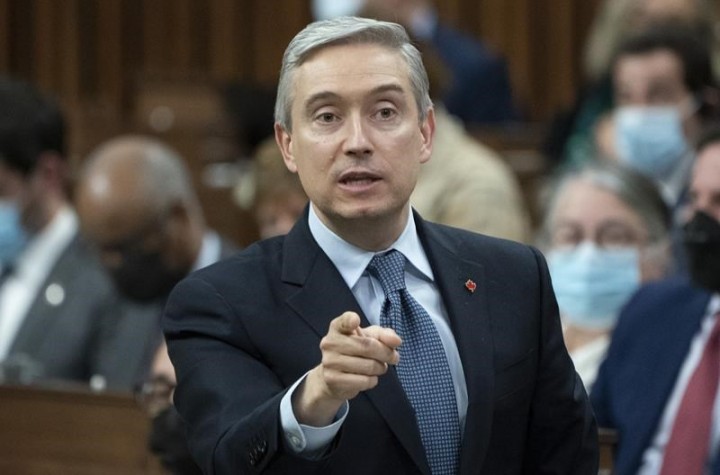OTTAWA — Innovation Minister François-Philippe Champagne is pressing G7 countries to establish a quick-reaction group on cybersecurity to help build up resilience to attacks following the invasion of Ukraine.
Champagne suggested to a meeting of G7 digital ministers in Germany that they pool expertise to fend off attacks and protect crucial information-technology infrastructure.
Ukraine’s Deputy Prime Minister and Digital Minister Mykhailo Fedorov joined the G7 meeting virtually — which Champagne says prompted not just empathy but a desire for action from Canada and its allies.
Champagne’s call for a quick-reaction group follows warnings by the cybersecurity agencies of Canada, the United Kingdom, the United States, Australia and New Zealand — known as the Five Eyes — that sanctions on Russia could expose them to cybercrime.
Speaking after the G7 meeting, the minister said the proposed cybersecurity working group would help better prepare Canada and its allies to fend off cyberaggression now and in future.
“This was an important topic of discussion: How can you do more together?” he said. “What we proposed is a working group to increase our collective resilience.”
He said the G7, which includes the United Kingdom, the United States and Germany, discussed learning from what has happened in Ukraine as well as the experiences of other nations subjected to cyberattacks.
Last month, the U.S. Cybersecurity & Infrastructure Security Agency warned in a statement about cybercrime on its website that the imposition of sanctions on Russia and support for Ukraine by the United States and its allies could prompt cyberattacks.
The statement said it could “occur as a response to the unprecedented economic costs imposed on Russia as well as material support provided by the United States and U.S. allies and partners.”
Canada’s Security Intelligence Service warned in a public report published last week that “Canada remains a target for malicious cyber-enabled espionage, sabotage, foreign influence, and terrorism-related activities which pose significant threats to Canada’s national security, its interests and its economic stability.”
It said “cyber actors conduct malicious activities” to advance political, economic, military, security and ideological interests and to compromise government and private-sector computer systems.
The report warned “Russian cyber actors” remain a threat to Canada, as do those linked to China, which “continue to target multiple critical sectors within Canada.”
Last year, state-sponsored actors from China “engaged in the unprecedented and indiscriminate exploitation of Microsoft Exchange servers, putting several thousand Canadians entities at risk,” the report said.
Ralph Goodale, Canada’s high commissioner to the United Kingdom, said in an interview that Canada already co-operates closely with the U.K. to combat cyberattacks, exchanging expertise.
He said there was evidence of state-sponsored interference in elections in the West including in Canada, adding that Canada’s technical experts are working to combat “this threat to democracy.”
“All democratic countries around the world are aware that there are state actors and non-state actors with malicious intent,” Goodale said. “We have to be alert to that.”
NDP foreign affairs critic Heather McPherson said Canadians have seen “the devastating impact cyberattacks can have.”
She said there are increasing concerns about the threats cyberattacks pose to critical infrastructure “and the protection of our democracy.”
“Past reports have documented the numerous attacks on government computer systems and the high frequency of these attacks,” she said.
“Despite the strategy launched by the federal government, Canadian organizations continue to be victims of increasing daily cyberattacks.”
The NDP MP said the government should help Ukraine protect its critical infrastructure from Putin’s attacks.
This report by The Canadian Press was first published May 13, 2022.
Marie Woolf, The Canadian Press
Related


































